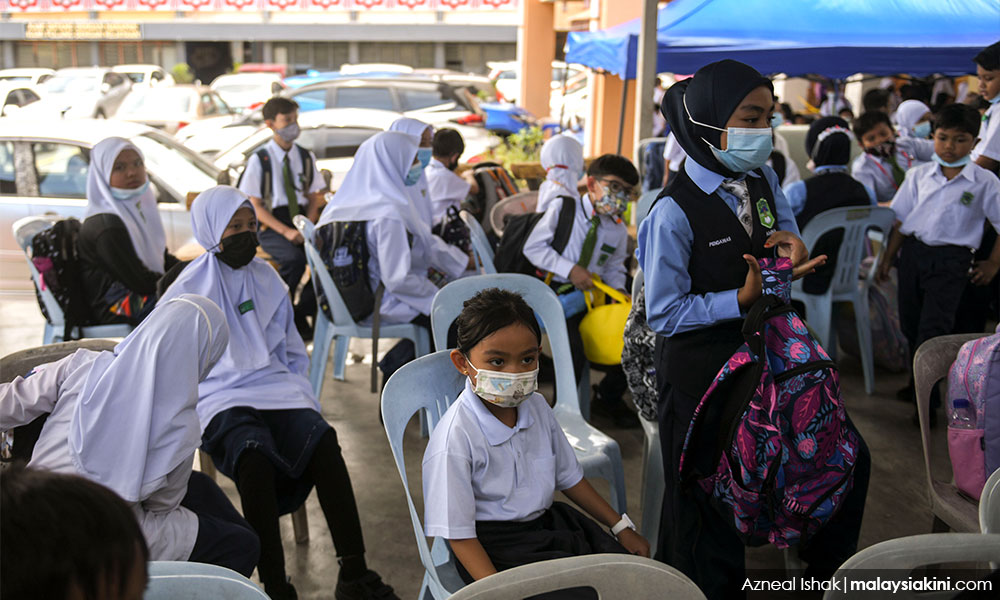After the Hari Raya Aidilfitri holidays, school sessions are set to resume with the home-based teaching and learning (PdPR) method for two weeks to prevent the spread of infections after the festival.
Although some parents are relieved by the decision, many are also worried if their children would be able to learn effectively.
The issue is also of concern as the implementation of PdPR previously had its weaknesses, including the problem of "digital poverty" as well as the gap in access to online education, which has caused many students, especially among the B40 group, to be left behind.
Even those who possess the required devices and have decent internet access claim that their children find it difficult to focus during PdPR as compared to the face-to-face learning process in school, which is deemed to be more effective.
Several opposition MPs in a joint statement today also expressed the concerns of many parties, especially parents and teachers regarding the development of children's education, as they may also fall behind in terms of the syllabus.
The MPs are Maszlee Malik, who is Pakatan Harapan Education Committee chairperson, Nik Nazmi Nik Ahmad, Teo Nie Ching and Hasan Baharom.
"Even more worrying is the fact that parents also do not know if their children are really learning and mastering the topics taught. Parents cannot check the exercise books, and the Education Ministry (MOE) has not provided a guide - physically, nor through any specific application - for parents to monitor their children's learning and development," read the statement.
The MPs are of the opinion that the MOE should provide self-learning materials to students with a new and flexible pedagogy to address the issue.
They also raised concerns with regard to students who will sit for the Sijil Pelajaran Malaysia (SPM) examination this year, as the implementation of the movement control order (MCO) for long periods of time when they were in Form 4 last year as well as in Form 5 currently had affected their performance and learning.
According to them, if last year's SPM students were only affected during Form 5, this year’s students would be affected for almost two years.
"Therefore, this year's SPM students' mastery of Form 4 and 5 subjects is very much affected and is weak. The MOE should reduce the number of subject topics according to their actual period of study. The fact is, when they were in Form 4 last year, there was no organised PdPR, and it’s as if they have lost a year of studies,” they said.

In the meantime, the group suggested that the MOE use the Hotspot Identification for Dynamic Engagement (Hide) system to identify if it was suitable to close a particular school.
"For rural places that are not near any infection hotspots, nor have any movements in and out of their areas, the MOE should allow these schools to remain open, especially because the internet access is not adequate for them to undergo PdPR," he said.
Meanwhile, Anuar Ahmad from the Centre for Community Education and Wellbeing at Universiti Kebangsaan Malaysia (UKM) said the PdPR method should be carried out in various forms, and not just focus on online learning.
He said this was because based on a study conducted, almost 60 percent of students did not have proper internet facilities and devices.
According to Anuar, all teachers should also already have a contingency plan in place to deal with any eventuality, including school closures.
"It means that if the school wants to close for 10 days, all teachers already have a set of PdPR notes in case the school closes. The school must be ready and have the photocopies ready. If the school is closed, they can distribute the notes. (For example) If it closes today, by tomorrow it (the notes) must be distributed to the students.
"If the school area has internet and students can afford it, they can do it online. This (distribution of physical notes) is for those who do not have internet or cannot afford it. So, when the notes are distributed, students will practice and continue learning even when they are at home," he said.
Apart from that, he said the method of learning through television and radio, such as DidikTV, also needs to be streamlined and expanded, so that it is used optimally.
"Another method is the outreach programme, where teachers go to the community. Teachers do not wait for students to come to school, but they themselves go to the students. Teachers in Sabah and Sarawak use this approach a lot.
“When teachers come to a house, the students there will inform friends living nearby to come and learn together," he added.
- Bernama



No comments:
Post a Comment
Note: Only a member of this blog may post a comment.